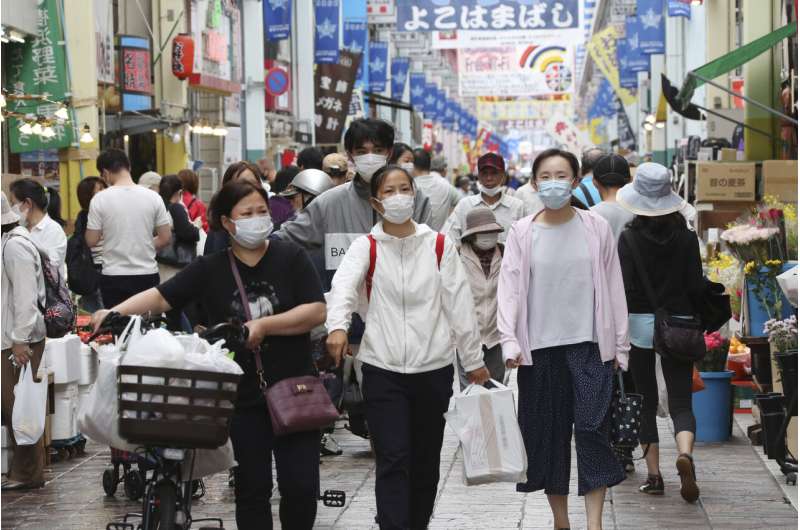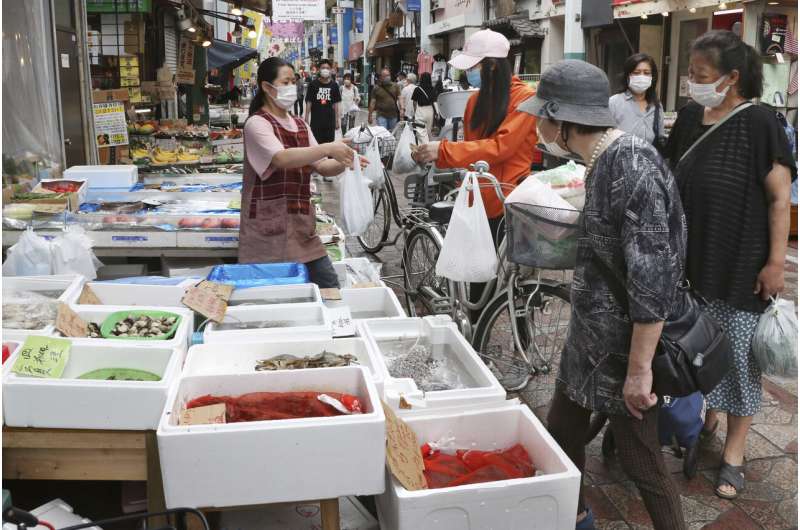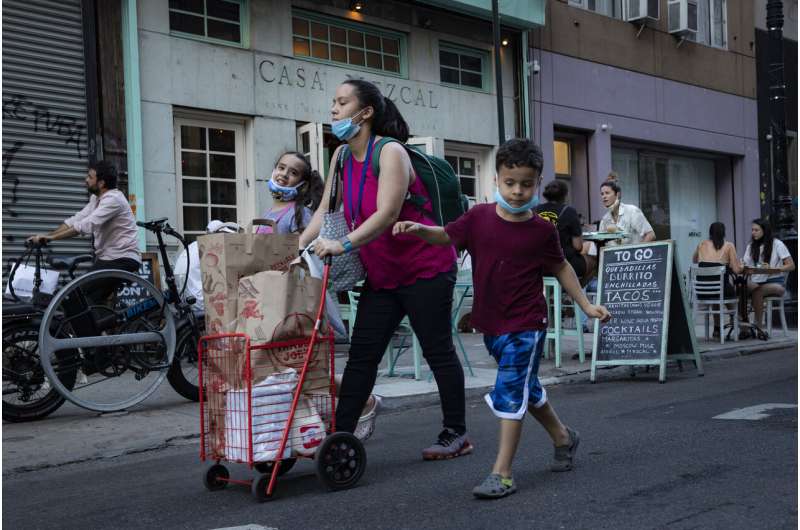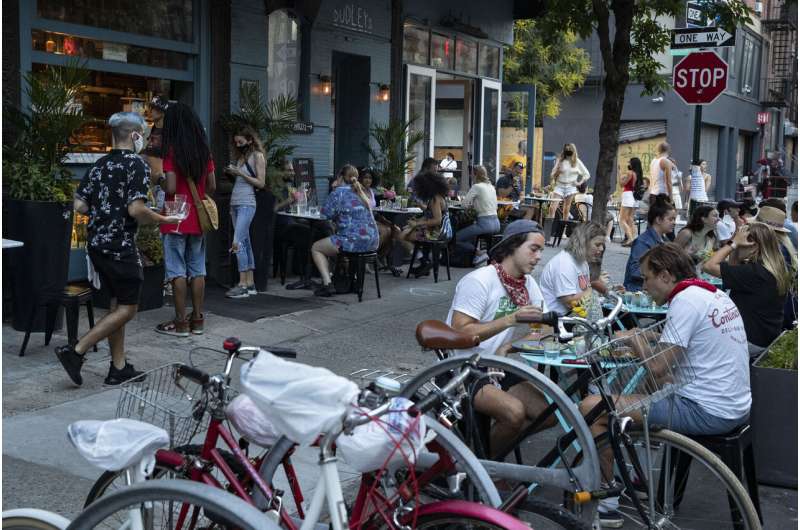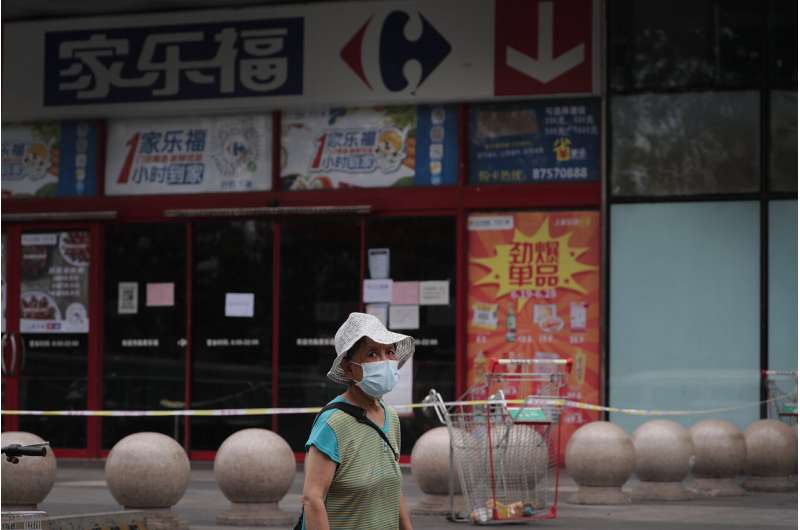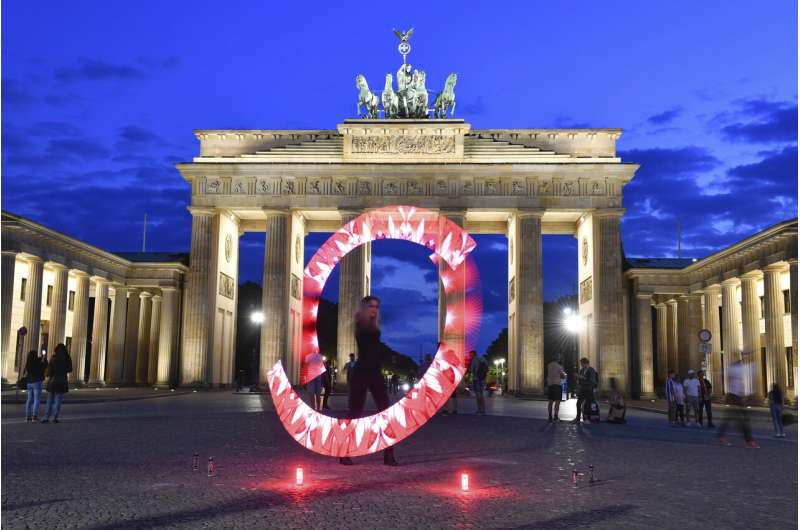People wearing face masks shop at a mall in Yokohama, near Tokyo, Tuesday, June 23, 2020. Japan's economy is opening cautiously, with social-distancing restrictions amid the coronavirus pandemic. (AP Photo/Koji Sasahara)
The number of global coronavirus cases continued to surge Tuesday in many large countries that have been lifting lockdowns, including the U.S., even as new infections stabilized or dropped in parts of Western Europe.
India has been recording about 15,000 new infections each day, and some states Tuesday were considering fresh lockdown measures to try to halt the spread of the virus in the nation of more than 1.3 billion. The government earlier lifted a nationwide lockdown in a bid to restart the ailing economy, which has shed millions of jobs.
Hospitals in Pakistan are turning away patients, but with the economy there teetering, the government remains determined to reopen the country.
New cases have also been rising steeply in Mexico, Colombia and Indonesia.
Brazil, with more than 1.1 million cases and 51,000 deaths, has been affected more than anywhere but the U.S., which has reported more than 2.3 million cases and 120,000 deaths, according to a tally kept by Johns Hopkins University.
In the U.S., surges in cases across the South and West are raising fears that progress against the virus is slipping away, as states reopen and many Americans resist wearing masks and keeping their distance from others.
On Tuesday, Dr. Anthony Fauci will return to Capitol Hill at a fraught moment in the nation's response. The government's top infectious disease expert will testify before a House committee.
People wearing face masks shop at a mall in Yokohama, near Tokyo, Tuesday, June 23, 2020. Japan's economy is opening cautiously, with social-distancing restrictions amid the coronavirus pandemic. (AP Photo/Koji Sasahara)
His testimony comes after President Donald Trump said at a weekend rally in Oklahoma that he had asked administration officials to slow down testing, because too many positive cases are turning up.
Many rally goers did not wear masks, and for some that was an act of defiance against what they see as government intrusion. White House officials later tried to walk back Trump's comment on testing, suggesting it wasn't meant to be taken literally.
Dr. Michael Ryan, the World Health Organization's emergencies chief, said the record number of new cases couldn't be explained by increased testing alone, noting many countries have seen large increases in hospital admissions and deaths.
"The epidemic is now peaking or moving towards a peak in a number of large countries," he said.
WHO Director-General Tedros Adhanom Ghebreyesus said it took more than three months for the world to see 1 million confirmed infections, but just eight days to see the most recent 1 million cases.
Pedestrians pass customers dining outside Casa Mezcal, Monday, June 22, 2020, in New York. New York City ventured into a crucial stage of reopening as stores let people in Monday, offices brought workers back, restaurants seated customers outdoors and residents both welcomed and worried about rebounding from the nation's deadliest coronavirus outbreak. (AP Photo/John Minchillo)
"The greatest threat we face now is not the virus itself; it's the lack of global solidarity and global leadership," he said during a video conference for the Dubai-based World Government Summit.
Even some countries that have had initial success in stamping out the virus are finding pockets of resurgence.
In Australia, Victoria state on Tuesday reported 17 new cases, resulting in the closing of two primary schools in Melbourne. State Premier Daniel Andrews said there would be significant community transmission among the new cases.
China reported 22 new cases, including 13 in Beijing, a day after a city government spokesperson said containment measures had slowed the momentum of a new outbreak in the capital that has infected more than 200 people.
And South Korea reported 46 new cases, including 30 linked to international arrivals.
-
Customers dine outside Dudley's, Monday, June 22, 2020, in New York. New York City ventured into a crucial stage of reopening as stores let people in Monday, offices brought workers back, restaurants seated customers outdoors and residents both welcomed and worried about rebounding from the nation's deadliest coronavirus outbreak. (AP Photo/John Minchillo)
-
A woman wearing a protective face mask to help curb the spread of the new coronavirus walks by a barricaded Carrefour supermarket in a shuttered shopping mall following positive cases detected at the mall in Beijing, Tuesday, June 23, 2020. China reported close to two dozen new cases of coronavirus on Tuesday a day after a city government spokesperson said containment measures had slowed the momentum of an outbreak in the capital that has infected more than 200 people. (AP Photo/Andy Wong)
-
dpatop - 22 June 2020, Berlin: A light artist performs with red lights in front of the Brandenburg Gate as part of the "Night of Light" campaign in Berlin Monday, June 22, 2020. With the protest the event and entertainment industry wants to show its existential situation due to the outbreak of the new coronavirus. (Jens Kalaene/dpa via AP)
The country has been struggling to stem a resurgence of the virus in the Seoul metropolitan area, where hundreds of infections have been linked to entertainment and leisure activities, church gatherings and low-income workers such as door-to-door salespeople and warehouse workers who couldn't afford to stay home.
South Korea also said it was testing 176 workers at the southern port of Busan following a virus outbreak among crew members of a Russian cargo ship that has so far sickened 16.
Saudi Arabia said this year's pilgrimage, or hajj, to Islam's holy sites will not be canceled, but only "very limited numbers" of people will be allowed to take part. The hajj traditionally draws around 2 million Muslims from around the world for five intense days of worship and rituals in Mecca.
Worldwide, more than 9 million people have been confirmed infected by the virus and more than 472,000 have died, according to the Johns Hopkins University tally. Experts say the true numbers are much higher because of limited testing and cases in which patients had no symptoms.
© 2020 The Associated Press. All rights reserved. This material may not be published, broadcast, rewritten or redistributed without permission.
